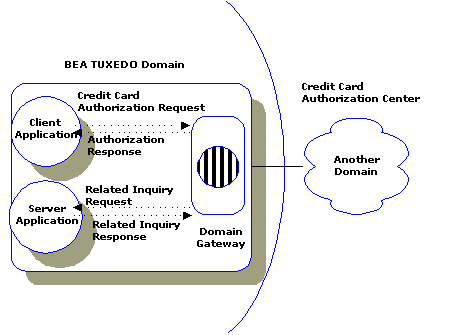


|

|
|
|
|
Building a Multiple-domain Configuration
To build a multiple-domain configuration, you need to consider the following tasks:
Domains achieve these tasks through a highly asynchronous, multitasking, multithreaded gateway. A domain gateway (DGW) is a BEA Tuxedo-supplied server that handles requests to remote domains and from remote domains. Any request can be processed within a transaction. The following figure illustrates how one BEA Tuxedo domain communicates with another domain via a domain gateway.
Two-way Communication Through a Gateway
In this illustration, the gateway processes outgoing credit card authorization requests to another domain. The gateway also handles incoming authorization responses. Domain gateways manage all the communication between domains. The gateway processes include a gateway administrative server (GWADM) that enables run-time administration of the domain gateway group and a Domains administrative server (DMADM) that enables run-time administration of the BEA Tuxedo application-wide Domains configuration information. Tools to Set Up and Maintain a Multiple-domain Application The following illustration shows the tools provided by the BEA Tuxedo system for setting up and maintaining a multiple-domain configuration. Domains Administrative Tools
Types of Domain Gateways
The BEA Tuxedo system provides different types of gateways to accommodate various network transport protocols used to communicate with remote domains. Access to remote domains that use the same communication and transaction commitment protocol is provided through a group of gateways that implement the configuration defined for a particular local domain. Following are the different types of domain gateways:
Note: GWTDOMAIN gateways should not be specified as members of an MSSQ set. They should not have a reply queue (REPLYQ=N should be specified). GWTDOMAIN gateways are recommended to be restartable.
Functionality Supported by Domain Gateways
Domain gateways support the following functionality:
See Also

|

|
|
|
|
Copyright © 2001 BEA Systems, Inc. All rights reserved.
|